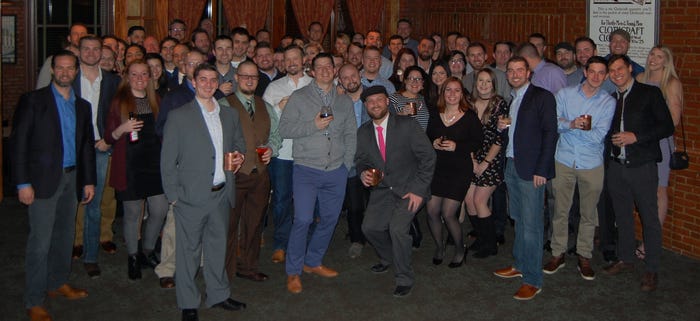Fenn recently spoke with us about how the company has managed to hit double-digit percentage revenue growth annually since its inception and the company’s goals for 2017.

John Fenn, cofounder of Budget Dumpster, a broker that specializes in dumpster rentals for homeowners and contractors, took a leap of faith in 2005 when he turned down a firefighter paramedic role to launch his own junk removal company, Cleanup Contractors.
While running that business, he discovered a void in the market for affordable and strong dumpster rental services for first-time dumpster renters and do-to-yourselfers and decided to create Budget Dumpster to cater to that demographic.
Over the past eight years, Fenn has built up Budget Dumpster to offer services in more than 150 cities in 46 states.
“Fenn defines the entrepreneurial spirit. He left a stable career to build the Budget Dumpster business from the ground up without any outside investments,” says Fenn’s coworker Sean Nally. “Fenn identified that many waste removal services were only accommodating those who are consistently renting dumpsters. By focusing on a severely underserved market, Budget Dumpster rented more than 80,000 dumpsters in 2016. In addition to filling a void in the market, he has created a business that is designed to help people.”
Waste360 honored Fenn with a Waste360 40 Under 40 award this year. The firm also ranked No. 67 in Waste360’s 2016 Top 100 ranking. Fenn recently spoke with us about how he came up with the concept of Budget Dumpster, how the company has managed to hit double-digit percentage revenue growth annually since its inception and the company’s goals for 2017.
Waste360: Tell us a little bit about your background and how you came up with the concept of Budget Dumpster.
John Fenn: In 2005, I started a junk removal company called Cleanup Contractors with my brother-in-law Mark Campbell, who is still my business partner to this day. At that time, we thought we were going to be like 1-800-GOT-JUNK?, and our goal was to take our junk removal company as far as we could. We performed all of the labor for our junk removal projects with a small crew, and rented dumpsters from a local company in Cleveland to dispose of the waste. Typically, our projects consisted of whole home cleanouts or attic/basement cleanouts.
While working with the local dumpster company, we were receiving contractor prices due to our volume of work, but we weren’t receiving the best service. And on top of that, we were receiving a large amount of calls about dumpster rental services, even though we didn’t offer those services. After a while, we spoke to one of the dumpster companies here in Cleveland about potentially offering dumpster rental services to our customers because we noticed that majority of the local dumpster companies lacked an interest in servicing customers who were only going to rent a dumpster one or two times. We ended up working out an agreement with that company, and we started offering dumpster rental services as a broker, ultimately becoming Budget Dumpster.
As a broker, we live within the margin of the markup between the retail cost and wholesale discount to provide our customers with the best prices and services possible. In addition to great costs and services, we are able to provide customers with dumpsters for longer periods of time. We market and sell on behalf of all of our haulers and provide them with service orders they typically wouldn’t have gotten because they cater to mostly commercial customers.
We are now in our eighth year of business, and we operate in pretty much every major market in the U.S. In 2017, I anticipate us doing about 120,000 dumpster service orders with more than 300 haulers across the country.

Waste360: Since 2009, Budget Dumpster has seen double-digit percentage revenue growth every year. What are some of the factors that have helped the company with its continued growth?
John Fenn: In the beginning, it was easy to grow quickly because we were able to take our model and apply it nationally. Each time we expanded into a new market, our revenue would hit double digits and the business would grow. Eventually, we expanded into every major market in the country, which has made continued growth a little harder for us.
In 2016, we closed the year with about $40 million in revenue, which is still in the double-digit range for us. Even though we are continuing to reach our revenue goals, it’s getting harder for us to achieve them because we don’t have as many new markets to move into.
Waste360: Explain your implementation of flat rate pricing and how you have been able to streamline the company’s consumer dumpster rental process.
John Fenn: Flat rate pricing is one of our huge selling points. It doesn’t work super well for people who are in the know and doing demos or rebuilds, but it works well for the average homeowner who is cleaning out their attic or basement.
A lot of our customers, who are average homeowners who may rent a dumpster once or twice in their lives, often don’t understand tonnage and the dimensions of a dumpster so we try to simplify those things for them by packaging all of the different fees and costs into one rate. The only way customers will end up paying an additional fee is if they go over the weight limit of the dumpster or if they don’t comply with a local regulation and dispose of materials that aren’t allowed in dumpsters, such as e-waste.
Waste360: Tell us a little bit about the company’s proprietary software and how it has reduced pricing errors and improved efficiency for both customers and internal sales reps.
John Fenn: Our proprietary mapping software is built off Google’s API Console and equipped with a lot of data from the U.S. Census Bureau, which is available for free. To create the software, we hired a man from Hungary who works at a geospatial firm that focuses on oil exploration and routing and tracking oil vessels to help us develop a very specific geospatial program with mapping technology.
Before we developed the software, it would take us between 10 and 12 minutes to get through a dumpster order because we had to ask a lot of questions and search for available haulers and dumpsters. With the new software, we are able to get through dumpster orders in about 4 to 6 minutes, which is approximately half the time it used to take us to process orders.
The new software has been beneficial to both us and our haulers because it allows us to accurately keep track of inventory, routing, new rules and regulations, what can and cannot go into bins in each municipality, etc. As we continue to grow, we will continue to roll out new features to make the process easier for us, our haulers and our customers.
Waste360: What are some of Budget Dumpster’s goals for 2017?
John Fenn: Historically, we have only worked with our haulers to provide temporary roll-off services to our customers, but going into 2017, we are going to offer permanent front-load commercial services to our customers as well. In order to make that happen, we are working with new haulers who can offer that type of service.
In addition to that, we are working on becoming a better company every day by providing improved services and entering smaller, niche areas. In the past, we steered clear of smaller cities because it didn’t make sense to move into those markets, but now we are in a place where we can expand into those smaller markets and see the benefits.
We are also focusing on bettering our relationships with our haulers and making them more intimate. There has always been a weird dynamic between haulers and brokers, but over the years, we have built up great relationships with all of our haulers. If our haulers aren’t performing to certain standards, we will move on to other haulers because it’s all about customer service for us. In the past, we had trouble with our haulers working with us to correct our wrongs, but now that we are bigger and make up more of their businesses, our haulers are more willing to work with us to improve services.
Lastly, we are investing in different technologies to improve our services and getting more involved with local communities through charity events, sponsorships and environmental cleanups.
Waste360: How do you stay ahead of your competition?
John Fenn: This industry is a rough industry, and it can be very blue collar at times. To stand out from our competitors, we focus on customer service and have a very strict hold time of less than 10 seconds. All of our employees go through an extensive training process to become knowledgeable about the areas they are working in so that they can accurately answer questions about the location of landfills and transfer stations, which materials can be placed in the dumpsters, which haulers service specific areas, etc.
A lot of the companies in this industry cater to larger customers like construction companies because they want the repeat business, but we have really crafted our business for the residential homeowners who need additional education and some help choosing the best dumpster option for their needs.
We also have an easy-to-navigate website that is filled with helpful tips, resources and videos. I often refer to us as the Hotels.com or Priceline.com of the dumpster industry because we provide the best options out there for our customers so they don’t have to do any of the hard work, such as comparing prices and finding out which haulers serve their area.

Waste360: If you weren’t in the waste and recycling industry, what field do you think you would be working in?
John Fenn: Before I was in the waste and recycling industry, I was a paramedic for a few years, and I was very interested in becoming a firefighter paramedic because I love to help people. I actually ended up getting a full-time job offer to become a firefighter paramedic, and I turned it down to pursue the junk hauling business because I am very entrepreneurial, and I have always wanted to start my own business. If my business didn’t turn into what it is today, I am positive I would have continued working as a paramedic.
Waste360: What advice do you have for the next generation of industry workers?
John Fenn: There are a lot of opportunities in this industry, and there is always room for improvement. I know people probably say that about a lot of other industries, but it’s very true for the waste industry. For example, more and more companies are developing and utilizing technology to do some cool things like waste-to-energy and organics diversion, and I am certain technology will be used in the future for a variety of other things.
I would also advise the next generation to focus on a particular area they are interested in and how you can make improvements in that area. This industry has so many different moving parts, and it’s important to know what you want to do so that you can make the most out of your career.
About the Author(s)
You May Also Like




